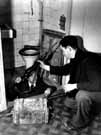
|
|
|

|

|

|

|
|
Click on an image to see a larger, more detailed picture.
|
|
|
|
|
| 1944: Desperate Acts |

|
pg. 512 |

|
|
|
|
| |
 In January 1944 SS functionary Adolf Eichmann distributed this secret telegram to all heads of the Sicherheitspolizei and Sicherheitsdienst in Brussels, Belgium. In it he ordered all Argentinean Jews residing in Belgium to the Bergen-Belsen, Germany, concentration camp. During the war, many Jews were protected by the Argentinean documents they carried. After the war, many Nazis and some Jewish survivors ended up in Argentina.
In January 1944 SS functionary Adolf Eichmann distributed this secret telegram to all heads of the Sicherheitspolizei and Sicherheitsdienst in Brussels, Belgium. In it he ordered all Argentinean Jews residing in Belgium to the Bergen-Belsen, Germany, concentration camp. During the war, many Jews were protected by the Argentinean documents they carried. After the war, many Nazis and some Jewish survivors ended up in Argentina.
Photo: Czechoslovak News Agency/United States Holocaust Memorial Museum Photo Archive
|
 With his body held taut by two Kapos, a camp prisoner awaits the sting of the lash on his bare back. Even the slightest offense could lead to harsh penalties. Punishment, like this whipping, could so weaken an inmate that he could no longer work, and failure to work meant death. This drawing by Hungarian artist Gyorgy Kadar, who survived five camps, powerfully conveys the inmate's suffering and anguish.
With his body held taut by two Kapos, a camp prisoner awaits the sting of the lash on his bare back. Even the slightest offense could lead to harsh penalties. Punishment, like this whipping, could so weaken an inmate that he could no longer work, and failure to work meant death. This drawing by Hungarian artist Gyorgy Kadar, who survived five camps, powerfully conveys the inmate's suffering and anguish.
Photo: Vanderbilt Univ. Holocaust Art Collection
|
 Deportations of Dutch Jews began in 1942 and were largely complete two years later. Most of the deportees were sent to Westerbork, and from there to Auschwitz or Sobibór. Few Jewish citizens of the Netherlands remained in the country in 1944, and their options were limited: hide; pay outrageous sums to local extortionists who promised to delay or cancel deportation orders; or resist. Here, members of the Dutch underground secrete a rifle and 9mm ammunition beneath a bathroom floor.
Deportations of Dutch Jews began in 1942 and were largely complete two years later. Most of the deportees were sent to Westerbork, and from there to Auschwitz or Sobibór. Few Jewish citizens of the Netherlands remained in the country in 1944, and their options were limited: hide; pay outrageous sums to local extortionists who promised to delay or cancel deportation orders; or resist. Here, members of the Dutch underground secrete a rifle and 9mm ammunition beneath a bathroom floor.
Photo: Cas Oorthuys, Netherlands Photo Archive
|
|

|

|

|

|
 February 10, 1944: Of 1015 Jews on a deportation train that arrives at Auschwitz from Holland, 800--including all of the children--are immediately gassed. 1229 Jews are deported from Westerbork, Holland, to Auschwitz.
February 10, 1944: Of 1015 Jews on a deportation train that arrives at Auschwitz from Holland, 800--including all of the children--are immediately gassed. 1229 Jews are deported from Westerbork, Holland, to Auschwitz.
|
 February 14, 1944: Reichsmarschall Hermann Göring wires Minister of Armaments and Munitions Albert Speer. He asks for as many concentration-camp inmates as possible for use as slave laborers in air-armament factories.
February 14, 1944: Reichsmarschall Hermann Göring wires Minister of Armaments and Munitions Albert Speer. He asks for as many concentration-camp inmates as possible for use as slave laborers in air-armament factories.
|
 February 20-25, 1944: In the Big Week (Operation Argument), American air units successfully engage German flyers in order to draw the Luftwaffe into a battle of attrition it cannot win. The Allies establish air superiority over Western Europe before D-Day.
February 20-25, 1944: In the Big Week (Operation Argument), American air units successfully engage German flyers in order to draw the Luftwaffe into a battle of attrition it cannot win. The Allies establish air superiority over Western Europe before D-Day.
|
|
|
|
|
| 1944: Desperate Acts |

|
pg. 512 |

|
|
The Holocaust Chronicle
© 2009 Publications International, Ltd.
|
|
